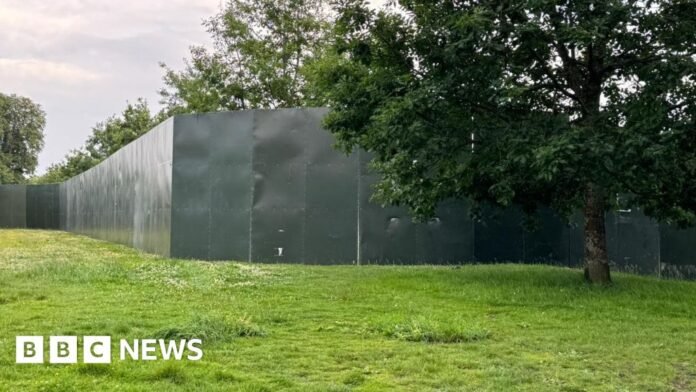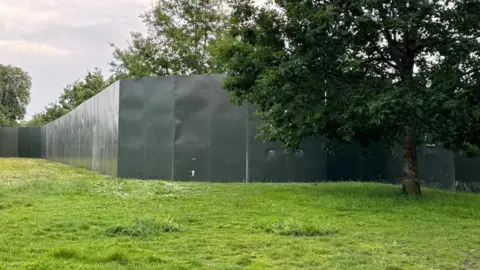 BBC
BBCPeople living near a popular city park have expressed concerns about it being fenced off to host a series of high-profile gigs.
Blackweir Fields, in Cardiff, has been converted into a temporary performance space hosting artists such as Alanis Morrissette and Stevie Wonder in June and July.
But concerns have been raised through a petition and a public meeting about the fields being blocked off with large fences as well as Cardiff council’s communication.
Council leader Huw Thomas said he accepted that the series of gigs – known as Blackweir Live – would cause disruption but said he made “no apology for wanting people to come to Cardiff”.
The first Blackweir Live performance, by the Grammy-nominated singer Noah Kahan, will take place later on Friday.
For Cardiff, the city’s Business Improvement District, said the concerts would offer “a much-needed footfall boost for local businesses at times when trade often dips”.
But Blackweir resident Fiona Peel, 74, who has lived in a cottage on the edge of the fields for more than 25 years, said the setup had left her feeling “anxious” and with “unanswered questions”.
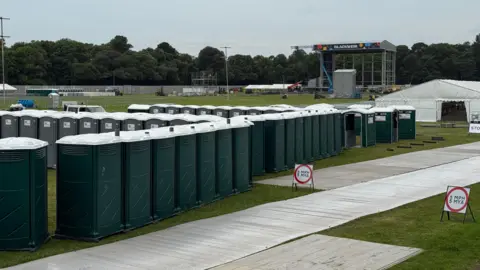
For the next few weeks, the fields that can usually be seen from her back garden have been replaced by a view of fencing, temporary structures and portaloos.
Ms Peel said she was given the option for the fence to be extended in a way that blocked her view of the fields.
“But for me to feel that I was behind a Berlin Wall is probably worse than having some visuals,” she added.
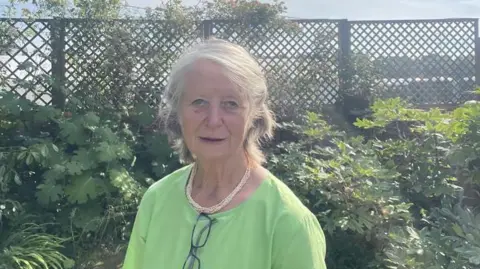
She said the decision to host at Blackweir was made “without consultation” from the council.
“It is a bit of a concern. I have had assurances that the safety of myself and other residents in the area will be prioritised,” said Ms Peel.
“We have not had a review of how successfully these concerts have gone or the impact on noise levels for nearby residents.”
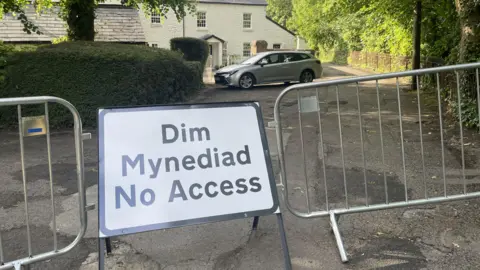
The fields will remain inaccessible to the public until 21 July, according to the Bute Park website.
Cardiff council said the concerts would bring £35m to the city’s economy which would be used to improve parks and infrastructure.
They are also expected to create 300 local jobs during the concert period.
Ms Peel recently attended a licensing committee meeting for the event which led to discussions about the long-term strategy for Blackweir Live.
“I believe it should be for one year, but I know they’ve got it in their heads to do it for at least two,” she said.
“We must have a proper review and review which site is best in Cardiff, and how to manage the really sensitive ecology of Bute Park.”
 Getty Images
Getty ImagesA petition set up in opposition to the concerts at Blackweir, which has amassed around 1,300 signatures, has argued that “parks are for people, not private profit”, arguing that the fields are a “unique heritage” which should have the status of other national landmarks like the Eryri National Park.
At the nearby Secret Garden Cafe, owner Melissa Boothman said Blackweir Fields were an “essential place” for people to relax and get out of the city centre.
She felt there were “better places” to host concerts in Cardiff which did not “have as much nature around them”, adding that Blackweir Fields had been recorded as an area of ancient woodland which was “highly unusual”.
The council said an assessment found the long-term impact on the park would be “negligible”.
 Syed Abbas
Syed AbbasBlackweir Fields is regularly used for cricket, but Syed Abbas, chairman of Bay Dragons Cricket Club which plays at Blackweir, said the decision to host the gigs in the fields had put the club at a “huge disadvantage”.
“We tap into a lot of these amateur teams for talent. Naturally, if there will be no cricket at Blackweir, where are all these people going to go?”
He said the council had installed an artificial pitch which would be used by the team this year.
One cricket pitch at Blackweir Fields would also remain in use for the full season, except for on the five concert dates, according to the council.
“We are lucky there will be no impact this year. But what does that mean for next year and so on as Blackweir Live grows,” he added.
Mr Abbas said the team had called Blackweir home for “over a decade”, but their future was now filled with “uncertainty and doubt”.
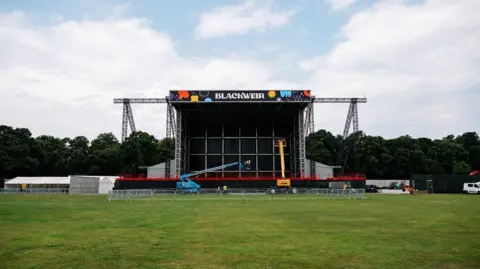 Rhodes Media
Rhodes MediaAt the public meeting on 19 June, the leader of Cardiff council, Mr Thomas, said the council had been thorough in following the advice of ecological consultants and experts.
“I accept there will be disruption for residents but we are doing our very best to listen to those concerns,” he added.
Mr Thomas said there was a “historic contract” for Blackweir Fields that already allowed it to host events of 25,000 people prior to this arrangement.
“I make no apology for wanting people to come into Cardiff and spend money.”
He said there would be “lessons learnt after each event”, adding that he “wants to see this continuing next year”.
Carolyn Brownell, of For Cardiff, said the concerts were “not just cultural milestones – they’re economic engines”.
“Major events like these summer gigs are crucial for bringing in new audiences and we remain committed to ensuring that Cardiff thrives as a dynamic and economically robust capital city.”



